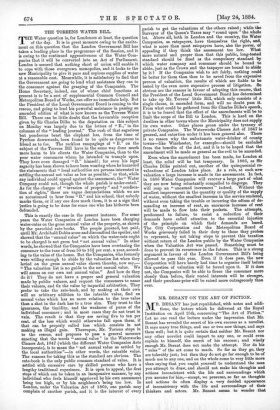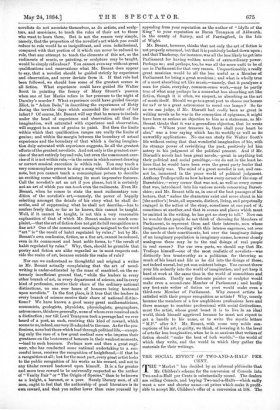MR. BESANT ON THE ART OF FICTION.
MR. BESANT has just republished, with notes and addi- tions, the lecture which be delivered at the Royal Institution on April 25th, concerning " The Art of Fiction." Let no one read the lecture under the impression that Mr. Besant has revealed the secret of his own success as a novelist. It says many true things, and one or two new things, and says them well; but it is quite certain that neither Mr. Besant nor any other novelist could impart to any one, or could even explain to himself, the secret of his success ; and wisely enough Mr. Besant does not make the attempt. Nor do his " rules " of the art come to much. So far as they go, they are tolerably just; but then they do not go far enough to be of much use to any one, and on the whole come to very little more than saying that you ought yourself to understand the man you attempt to draw, and should not make his thoughts and actions inconsistent with the life and surroundings which you assume for him,—except, we presume, so far as thoughts and actions do often display a very decided appearance of inconsistency with the life and surroundings of their thinkers and actors. Mr. Besant seems to wonder that novelists do not associate themselves, as do artists, and sculp- tors, and musicians, to teach the rules of their art to those who want to learn them. Bat is not the reason very simple, namely, that the proportion of the novelist's art which you could reduce to rule would be so insignificant, and even infinitesimal, compared with that portion of it which can never be reduced to rule, that any attempt to teach the elements of this art, as the rudiments of music, or painting, or sculpture may be taught, would be simply ridiculous P You cannot even say without great qualifications and reservations what Mr. Besant does appear to say, that a novelist should be guided strictly by experience and observation, and never deviate from it. If that role had been followed, we should lose some of the greatest scenes in all fiction. What experience could have guided Sir Walter Scott in painting the frenzy of Mary Stuart's passion when one of her Monies refers in her presence to the night of Darnley's murder P What experience could have guided George Eliot, in " Adam Bede," in describing the experiences of Hetty during the terrible days which succeeded the murder of her infant P Of course, Mr. Besant will say that he means to include under the head of experience and observation all that the imagination, well saturated with experience and observation, will suggest to a man of genius to paint. Bat then the limits within which that qualification ranges are really the limits of genius; and within the margin between the boundary of actual experience and the boundary of that which a daring imagina- tion duly saturated with experience suggests, lie all the greatest efforts of the greatest novelists. And not only is the greatest exer- cise of the art entirely beyond rule, but even the commonest exer- cise of it is not within rule,—in the sense in which correct drawing or correct musical execution is within rule. You may teach a very commonplace person to sing a song without uttering a false note, but you cannot teach a commonplace person to describe an exciting scene without missing its most impressive features. Call the novelist's art an art if you please, but it is certainly not an art of which you can teach even the rudiments. Even Mr. Besant, when he comes to state the most rudimentary con- dition of the novelist's art,—namely, the power of happily selecting amongst the details of his story what he shall de- scribe, and of suppressing what he shall not describe,—bas to confess freely that, so far as he knows, this cannot be taught. Well, if it cannot be taught, is not this a very reasonable explanation of that of which Mr. Besant makes so much com- plaint, —that the art of fiction does not get its full recognition as a fine art P One of the commonest meanings assigned to the word " art" is " the result of habit regulated by rules ;" but by Mr. Besant's own confession, fiction, as a fine art, cannot be reduced, even in its commonest and least noble forms, to "the result of habit regulated by rules." Why, then, should he grumble that poetry and fiction are alike regarded as in most respects out- side the realm of art, because outside the realm of rule P
Nor can we understand so thoughtful and original a writer as Mr. Besant actually complaining that the art of novel- writing is under-estimated by the mass of mankind, on the ex- tremely insufficient ground that, " while the leaders in every other branch of art, in every department of science, and in every kind of profession, receive their share of the ordinary national distinctions, no one ever hears of honours being bestowed upon novelists." In the first place, is it true that the leaders in every branch of science receive their share of national distinc- tions P We have known a good many great mathematicians, economists, geologists, physicists, physiologists, geographers, astronomers, thinkers generally, none of whom ever received such a distinction ; nor till Lord Tennyson took a peerage had we ever heard of a poet, as such, receiving this kind of reward, which seems to us, indeed, one very ill-adapted to the case. As for the pro- fessions, none but those which lead through political life,—except- ing only the case of a few great medical men who impress their greatness on the bestowers of honours in their weakest moments, —lead to such honours. Perhaps now and then a great engi- neer, who has conducted some national undertaking to a suc- cessful issue, receives the recognition of knighthood,—if that be a recognition at all ; but for the most part, every great artist looks to the public recognition of his works as his reward, and not to any titular reward bestowed upon himself. It is a far greater and more true reward to be universally respected as the author of " Vanity Fair " or " The Origin of Species," than to be known as a knight, a baronet, or a peer. Surely literary men, of all men, ought to feel that the authorship of good literature is its .own reward, and that you rather lower than raise yourself by appealing from your reputation as the author of " Idylls of the King " to your reputation as Baron Tennyson of Aldworth, in the county of Surrey, and of Farringford, in the Isle of Wight.
Mr. Besant, however, thinks that not only the art of fiction is not properly esteemed, but that it is positively looked down upon ; and that Thackeray, for instance, was all the less likely to get into Parliament for having written novels of extraordinary power. Perhaps so ; and perhaps, too, he was all the more unfit to be of use in Parliament for that very reason. Unquestionably, a really great musician would be all the less useful as a Member of Parliament for being a great musician ; and what is wholly true of a most absorbing art like music,—namely, that it paralyses a man for plain, everyday, common-sense work,—may be partly true of what may perhaps be a somewhat less absorbing art like fiction, though it is often, we suspect, as absorbing as the art of music itself. Should we go to a great poet to choose our horses for us P or to a great astronomer to mend our lamps P So far as we can judge, if Mr. Disraeli had really been as great in writing novels as he was in the conception of epigrams, it might have been as serious an objection to him as a statesman, as Mr- Besant thinks that it was a groundless objection, that he wrote novels. " Where your treasure is, there shall your heart be also," was a true saying which has its worldly as well as its unworldly applications. No one can study Sir Walter Scott's life without seeing that that wonderful imagination of his, with its strange power of revivifying the past, positively led him astray in his judgment of the political present. And if Mr. Disraeli's novels had been great novels,—great in anything but their political and social persiflage,—we do not in the least be- lieve that he would have been even the great party leader that he certainly was. The mind of a great novelist is not, and can- not be, immersed in the prose world of political judgment. Anthony Trollope tells us how he knew every corner of the map of Barsetehire,—every corner that was not, as well as every corner that was, introduced into his various novels concerning Barset- shire ; and Mr. Besant tells us, in one of the beat passages of his lecture, that "unless the characters exist and move about in his [the author's] brain, all separate, distinct, living, and perpetually engaged in the action of the story, sometimes at one part of it, sometimes at another, and that in scenes and places which must be omitted in the writing, he has got no story to tell." Now can he wonder that people do not think of choosing for Members of Parliament, to represent them and their interests, men whose imaginations are brooding with this intense eagerness, not over the needs of their constituents, but over the imaginary doings of an imaginary population in imaginary scenes, however closely analogous these may be to the real doings of real people in real scenes P For our own parts, we should say that Mr. Trollope himself—one of the most realistic of novelists—was distinctly less trustworthy as a politician for throwing so much of his heart and life as he did into the doings of these, not indeed unreal, but yet non-existent beings. You cannot throw your life ardently into the world of imagination, and yet keep it hard at work at the same time in the world of committees and constituents. Hardly any first-rate painter or sculptor would make even a second-rate Member of Parliament; and hardly any first-rate writer of fiction or poet would make even a third-rate Member of Parliament. Why cannot artists be satisfied with their proper recognition as artists ? Why, merely because the members of a few amphibious professions here and there manage to combine professional with social distinctions, must the artist, whose great boast it is to live in an ideal world, think himself aggrieved because he must not expect to get a handle to his name, or to write the mystic lettere " M.P." after it ? Mr. Besant, with some very noble con- ceptions of his art, is guilty, we think, of lowering it to the level of arts far less imaginative, when he is so anxious that writersof fiction should "make the best of both worlds,"—the world of which they write, and the world in which they gather the materials for their writings.

































 Previous page
Previous page